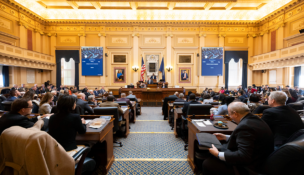

AI startup boom ‘here to stay’ in Virginia

The introduction of OpenAI — and disruption of DeepSeek — have fundamentally changed how existing businesses operate. Indeed, nearly half of chief information officers, chief technology officers and other tech leaders report artificial intelligence was fully integrated into their companies’ core business strategies — and a third said AI was fully integrated into products and services, according to a 2024 report by PricewaterhouseCoopers.
But at the forefront of AI-fueled innovation are startup companies that are paving the way so other businesses can operate more efficiently.
Between April and June 2024 alone, investors poured more than $27 billion into AI startups in the U.S., according to startup tracker PitchBook.
“The AI train is leaving the station, [and] you need to be on it,” Tom Loverro, general partner with venture capital firm IVP, wrote in a post on X in June 2024.
Zooming into Virginia, it’s “no surprise” there has been a “pretty big spike” in the number of AI-related startups during the past couple of years, says Jason Chen, CEO and executive director of Tysons cyber-focused startup accelerator Mach37.
There is no one industry that’s been left out of the AI startup boom in Virginia, Chen says.
“It’s everything from biotech to cybersecurity to data governance, you name it,” Chen says. “I couldn’t tell you that there was one specific subsector that seems to be jumping out in particular to us, at least within Virginia.” And in terms of investment, Chen says most of the Virginia-based AI startups his firm tracks have landed seven or eight figures in funding during the past couple of years.
Among Southern states, Virginia also ranks third in terms of deal flow for AI-related startup companies, according to a 2024 report by venture capital firm Valor Ventures. Virginia ranks among Texas and Florida, which boast data centers and military installations.
“Virginia’s entrance into the top three lends credence to the national trend of enterprise SaaS being the largest AI-augmented sector so far as cities such as Alexandria and Herndon are home to enterprise SaaS-focused startups,” according to the report.
Some of the most popular AI startup sectors in the South include enterprise SaaS, digital health, cybersecurity, retail, supply chain and logistics, the report shows. Enterprise SaaS and cybersecurity are the biggest AI startup sectors in Virginia, according to Valor.

Virginia’s cyber web
Blake Hall, founder and CEO of McLean-based verification service company ID.me, says Virginia is a natural fit for founding AI-related startups due to the state’s deep bench of cybersecurity talent.
In contrast to all of AI’s positive traits, bad actors can use these tools to create deepfake videos and other tricks that allow hackers to gain access to sensitive information or just confuse the public. Experts can ward off such misdeeds.
“There’s a lot of cybersecurity talent in this particular area that makes D.C. and Virginia really well-suited to be on the bleeding edge of protecting against some of the ways that unethical people will use AI tools to try to hurt folks,” Hall says. “It very much is a cat-and-mouse game on the AI side right now.”
Founded in 2010, ID.me serves as an example of a successful former startup that’s scaled in the era of AI innovation. Over the past decade and a half, ID.me has grown to become an AI-powered verification network for several federal government agencies, including the IRS, Veterans Affairs, the Social Security Administration, the U.S. Treasury and the FBI. As of late 2024, ID.me was valued at $1.8 billion.
Hall predicts the AI startup space in Virginia will continue to grow, particularly as enemy nation-states continue to build up their own AI.
“There are other nation-states that don’t share American values that are trying to really beat us in this race,” Hall warns. “I think it’s kind of like a new ‘Manhattan Project’ for America that actually should spur investment into the space. It’s really important that America wins and that you have AI that is infused with American values based on freedom and human rights.”
Despite the buzz brought on by DeepSeek’s debut in early 2025, it’s unlikely to be a platform or service Virginia startups use. DeepSeek, a China-based AI research lab that develops its own open-source AI models, is beginning to get banned over national security concerns, says Beth Burgin Waller, a principal attorney at Roanoke-based Woods Rogers law firm who specializes in cybersecurity and data privacy.
Gov. Glenn Youngkin issued an executive order Feb. 11 banning DeepSeek on state government devices and networks, Waller says, and “given these concerns — that are beginning to be echoed at the federal level and beyond in the private sector — I think the likelihood of any Virginia startups successfully integrating DeepSeek into their platforms or operations would be incredibly difficult.”

Still, the “AI boom is here to stay — at least in the short term,” Waller adds. Since Virginia is a leader in the technology industry, the state is “poised to play a central role” in the movement, she says.
Virginia is rich in data centers, with Northern Virginia considered the data center capital of the world, having the highest concentration of data centers globally. This makes it easier for AI startups to tap into resources other states are “racing” to build, Waller says. Plus, Northern Virginia has the second-highest tech employment rate of any U.S. metro area and has 2.5 times more computer science graduates than other tech hubs like New York City, San Francisco and Seattle, according to a November 2024 study by the Northern Virginia Technology Council.
“Between venture capital firms and large corporations like Amazon, Google and Microsoft operating themselves like VCs in this space, significant investment is being made across all areas of AI infrastructure,” Waller says. “From the energy sector and the push for expansion of data centers to the rush to innovate around processing chips — such as the quantum computing chip Microsoft announced this year — the world is in a race to create sustainable AI infrastructure.”
Systemwide development
While cybersecurity-related AI startups have a clear and impending impact, incubators across the state have seen an array of industries using AI.
“What I’m seeing is just how many different industries are leveraging AI,” says Morgan Evans, marketing and program manager of Startup Virginia, a Richmond-based nonprofit business incubator and entrepreneurial hub focused on high-growth businesses.
Some examples she provided were Richmond-based AI startup Rising Tide, which offers an automated platform for last-mile logistics, and Richmond-based Kinis.ai, a company that builds smart insoles that use AI to enhance athletic performance and improve wellness.
And despite Northern Virginia’s strong connection to the tech community, Evans says she’s witnessed AI startups form across the state, particularly in Central and Eastern Virginia because of the amount of entrepreneurial support in both regions.
“There’s a hope that we’re driving more and more tech-related companies — AI or not — to Richmond,” Evans says. “That’s grown a lot in the past few years. There’s a lot of people around here that want to help boost startups and connect them with the right people and the right ways to get their startups off the ground.”
The Roanoke and New River valleys and Southwest Virginia have also seen an increase in AI-related startups, says John Hagy, director of Roanoke-based startup accelerator Regional Accelerator and Mentoring Program (RAMP), which also has education offerings for startup companies.
“AI has been the biggest trend that we’ve seen,” Hagy says. “Like every company is incorporating AI in some capacity, whether that’s in the main product or in their operations. That has really been most present in some of the core competency industries of Southwest Virginia,” which include the agriculture, biomedical and national security industries.
For example, AI implementation by startups in the region has helped agriculture-focused companies produce a higher yield of crops, biomedical-focused companies identify surgical instruments and track vital signs, and security-focused companies in the region identify deepfakes and disinformation, Hagy says.
“AI has become more accessible to people, and they see the value of it against day-to-day business problems,” Hagy adds. “The reason that the startups are so secure and growing so much here in those three industries is because of the level of research. And we have the benefit locally of [agriculture] and biomed, which are large employers” in the region.
Being connected to the Virginia Tech community and its Northern Virginia hub have also helped AI-focused startups blossom in the region. Hagy says that while RAMP’s teachings are primarily focused on business fundamentals, entrepreneurial strategy and growth, the accelerator has also made a point to discuss the implications of AI with its cohorts. RAMP typically works with a partner or expert to explain to cohorts the importance and implications of AI implementation in their AI startups.
While there is interest from VC firms in providing capital to AI-related startups, Startup Virginia’s Evans also says it’s still a challenge to find capital for early-stage companies.
“That’s always just a struggle in general,” she says.
Proceed with caution
The promise of AI is exciting — but expensive. While large, well-funded companies have the manpower and resources to more quickly implement AI, smaller companies and startups have a steeper hill to climb.
Still, “there’s no reason to believe yet that the AI race will be winner-take-all,” according to an October 2024 article in Harvard Business Review about whether startups can survive in the age of AI. “There is still room for scrappy startups to eat away at market share.”
And while many companies have started to tout implementing AI into their products, services and operations, there are varying degrees to which the technology is being used. To stand out as an AI startup, it’s important to really be able to articulate the problem the company is solving and what is different or proprietary about the way the company is approaching a certain problem, Hall says.
“If you have good answers to those questions, then generally, investors and VCs are going to be predisposed to want to invest in your company,” Hall says.
While not trying to cast doubt, Chen with Mach37 says nearly all of the companies his firm tracks are trying to or claiming to incorporate some degree of AI into their solution.
“It is certainly a trend where I think the early-stage companies — and even growth-stage companies — have recognized the influence and impact that AI is now having across all of business, all industries,” Chen says. “If we were making investments, we’d be doing some pretty deep due diligence to see how strong the AI is, whether or not the AI is open source, or do they have an actual AI subject matter expert [or] an engineer on their team or not.
“You would just want to really dig deep to understand how much they really are pushing the needle.”
p

















